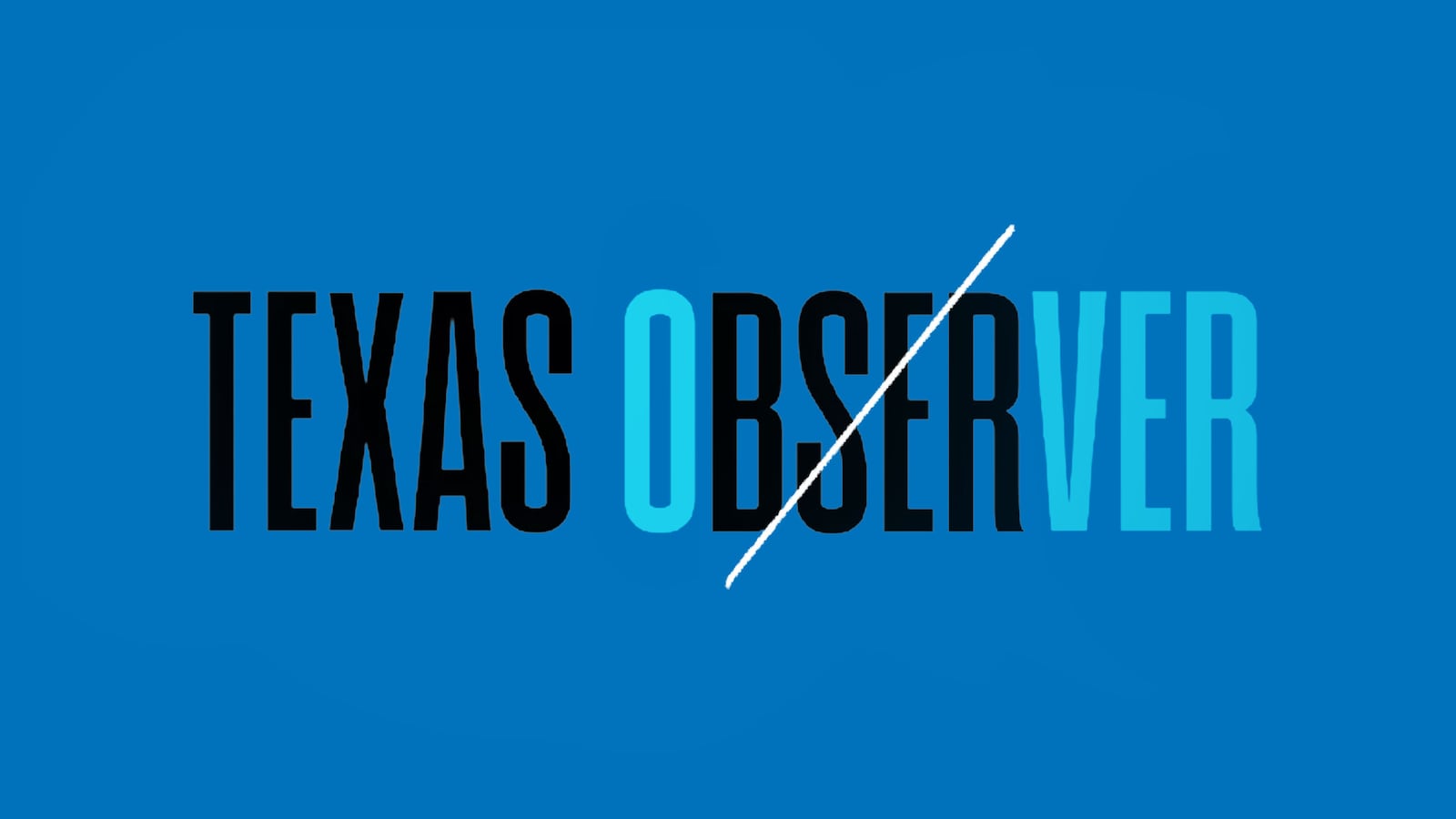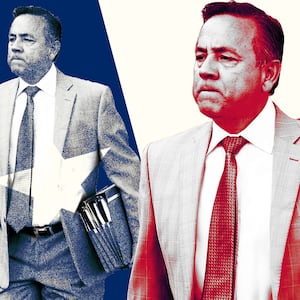UPDATE: By Wednesday evening, the magazine’s staff had raised more than $300,000 and announced that the board had voted to rescind “both layoffs and the closure.” Though much is still uncertain, The Texas Observer will remain open.
When news broke on Sunday night that the storied journalism institution known as The Texas Observer—the great incubator of national industry talent and Lone Star State muckraker once helmed by the irreverent Molly Ivins—a wave of fury, sadness, and hopelessness washed over the state’s press corps.
Nationally recognized journalists called the closure everything from an “ego-driven tantrum” to a “damn shame,” and it seems they’re just getting started. Some aren’t ready to give up on the historic magazine. But I’m paralyzed by sadness for what was my first real reporting home and what was, for Texas, a place uniquely and steadfastly dedicated to holding a spotlight onto injustice and oppression.
I’ve never talked about this publicly, but I’ll admit it now: It was a fluke that I even got my first-ever journalism fellowship at the Observer.
The interview went well, I thought. They liked me, but not as much as they liked four other candidates. I had graduated college early, but I had nowhere to go next. It wasn’t until one of the other chosen fellows had to drop out due to a family emergency that I got the call to move to Austin. Of course, I did it in a heartbeat. Moved into a vegetarian co-op in West Campus, bought a ton of business-casual clothing at the mall, mapped the walking distance from my brother’s east-side apartment to the Texas Capitol.
This was a dream come true. The Observer was founded in 1954 by Ronnie Dugger and its history includes a six-year period in the 1970s under Ivins, a truly inimitable leader.
“We will take orders from none but our own conscience, and never will we overlook or misrepresent the truth to serve the interests of the powerful or cater to the ignoble in the human spirit,” Dugger once wrote. For her part, Ivins called the magazine a “publication in a class by itself” in the book Fifty Years of the Texas Observer, which was published in 2004.
And it was a dream to report for them. The Texas Observer was the place for watchdog, muckraking journalism in Texas. The statehouse was—and still is—full of clownery, and there was only one outlet truly willing to report on it with teeth. Everyone else had seemingly become inoculated to the sexism and racism and the this-is-just-how-it-works of Texas politics. But the Observer’s editors didn’t care about ruffling feathers, as long as the story was true and smart and well-told. The Observer did not bend for access to officials. It was a place beloved by journalists and loathed by the corrupt.
And then, on Sunday, The Texas Tribune broke the news: The Texas Observer is shutting down and will lay off its 17-person staff, including 13 journalists. Emily Ramshaw, the co-founder and CEO of The 19th* and the former editor-in-chief of The Texas Tribune tweeted “holy shit” and then called it “a damn shame.”
During my first-ever week at the Observer, I pitched my mentor Forrest Wilder (now at Texas Monthly) and then-editor Dave Mann (now a senior editor with American Public Media) on the sexism I was witnessing; I thought the warnings they were giving me about who not to be alone with should be reported out into a story. They gave me exceptional advice: Write down everything. If there’s a story there after a few months of digging, we’ll run it.
In 2013, at the age of 21, I finished my exposé on sexism in the Texas Capitol. It went viral. But no policy changes were made. And nobody, and I mean nobody else in the entire statehouse press corps, would have run that story. Of course, four years later, I was able to write multiple follow-up stories in 2017 at The Daily Beast during the height of #MeToo, and it resulted in policy changes and panels and a lot of big showboating and taking a stand against sexism. None of that would have been possible without the Observer.
That same year, in 2013, then-contributing editor Saul Elbein published a hard-hitting story about a practicing physician whose patients kept ending up maimed and dead. Afterward, the physician, tagged “Dr. Death,” was sued and charged and convicted—and then sentenced to life in prison.
There were a stunning number of award-winning, world-changing pieces of journalism out of such a small shop. The 2000 investigation on an undercover drug bust that disproportionately targeted Black Texans from Nate Blakeslee. Nearly everything written by National Magazine Award finalist and author Melissa del Bosque.
This was the Observer at its best; it made way for others to do what was right. It was always willing to go where no one else dared. Digging beyond headlines with rigorous, fact-based reporting that was not pretending to be neutral to injustice. “We seek not only to inform, but to empower our readers, as we work to hold public officials and corporations accountable,” reads the Observer website. “Our reporters recognize that oppressed people are experts on their own lives.”
Today, the Observer’s editor has said it is focused on reporting out women’s health issues, political extremism, Texas rivers and on the Biden administration’s border policies. That is, until the newsroom shuts down on Friday.
Elbein told me Monday that, “for generations of Texas journalists,” the Observer served as a “career incubator and proving ground—a place that gave us the guidance and leeway to do big, serious stories at a time in our careers when other publications would have had us fetching coffee.” That sentiment was repeated over and over again on Monday. Other notable Observer alums include Lawrence Goodwyn, Jake Bernstein, James K. Galbraith, and Jim Hightower.
Elbein, now a Texas reporter for D.C. outlet The Hill, also noted that its loss will leave a sizable “hole in the Texas media landscape.”
“But it also opens a lane for a publication to replace it—one with a mandate and management system better suited to Texas as it is, rather than what it was, and that can reach the kind of mass audience the Observer long ago gave up on,” Elbein added.
Pamela Colloff, the prolific and acclaimed Texas crime reporter who once won the MOLLY National Journalism Prize given out by the Observer in honor of Molly Ivins, called the magazine “a model for many of us.” (Full disclosure: I was on the judging committee for the award for several years.)
“Right now we need more, not less, independent journalism that speaks truth to power. It’s a devastating loss for journalism and for Texans,” said Colloff. “I can’t overstate how much The Texas Observer shaped and inspired generations of journalists, or what an important incubator of talent it was, decade in and decade out.”
Kolten Parker—a former editor at the Observer—on Monday called the news “hard to swallow.”
“It’s a sad day for independent journalism, for Texas and for the extremely talented and dedicated staff of The Texas Observer,” said Parker. “It provided for me, as it did countless other journalists, a space to craft hard-hitting journalism that owed nothing to anyone or anything except the truth. The high editorial standards and freedom of the Observer is liberating for writers, readers and voiceless communities in Texas. The biggest immediate concern is the people who found out their livelihood is gone through tweets on a Sunday night. Hire them.”
The Tribune reported that the decision to shut down the “legendary” publication was ultimately made by the board of the nonprofit Texas Democracy Foundation, which owns the magazine. The group reportedly voted on Wednesday to approve the layoffs.
Asher Elbein, a contributing editor and longtime freelancer at the Observer—and Saul’s brother—was the most willing to place blame firmly on the shoulders of the organization’s board, calling them “cronyistic, inattentive, irresponsible and reactionary.”
“It was the board’s decision-making over the past few years that drove serious staff turnover at the Observer,” said Elbein. “It was the board’s decision to make a difficult dispute among staff worse by taking a nearly finished issue and throwing the publication into a hiatus. The board gutshot the Observer, wondered why it was dying, and now claim that an inability to fund it means they have to put it out of its misery. Well, yeah. Times are tough for independent journalism. They’re tougher still when these were the people tasked with making sure it could continue.”
He added, “If the board doesn’t feel that they can help The Texas Observer survive, that’s naturally their prerogative. But they should turn it over to the people who make it, who have a vested interest in keeping it alive.”
Robert Frump, who ran the magazine’s business operations as a special adviser, resigned in protest on Thursday, according to the Tribune.
“Our reader base and our donor base is aging out,” Frump told the website. “There’s a nostalgia for Molly Ivins and Ann Richards and their era, and that’s a lot of what still drives the Observer. We weren’t able to build a bridge to the younger, progressive generation. I think the legacy is worth fighting for, but I do understand why the board feels the way it does.”
Del Bosque tweeted on Sunday evening that the news was “infuriating,” adding that “it’s not true that there was no future for a publication like the Observer in Texas. On the contrary. It’s needed now more than ever. I spent a decade there. You don’t just shut down a historic publication overnight like it’s nothing. Shameful.”
Jeff Rotkoff, an Austin-based veteran Texas progressive advocate and organizer, said that the magazine was once one of many “constellations in the political sky.”
“The Observer was unafraid to call a lie a lie, and to unapologetically distinguish right from wrong,” said Rotkoff. “It’s been home to some of the best Texas storytelling, because journalists at the Observer weren’t saddled with obligations to false equivalency. Today’s news is a heartbreak not just for so many talented journalists and Observer alum, but for anyone who knows we can’t build a Texas future for all our families and all our kids without brave, brash, accountability journalism.”
But maybe it isn’t a funeral after all.
Dan Solomon, a senior editor at Texas Monthly, tweeted Sunday, “Voting to pull the plug after decades without crowdfunding or publicly seeking new funding sources is incredibly short-sighted, and I hope it’s not too late to do those things.” He added, “The rest of us who cover Texas will have to work harder than ever if the observer folds. It’s been an incredible asset to the state, and to the mission of holding power accountable in a place where that is not something many are inclined to do.”
Steven Monacelli, a former special investigative correspondent at the magazine, reported Monday that “Texas Observer editorial staff have offered a counter proposal: Have the board members who voted for closure resign while top editors will work voluntarily and be given the chance to try to raise funds. They’ve also asked for a staffer to be added to the board as a voting member,” adding that the Observer would need to raise about $200,000 to avoid immediate closure.
Said Solomon, “If the board doesn't take them up on this, I don't know how you can view that decision as anything other than an ego-driven tantrum.”








